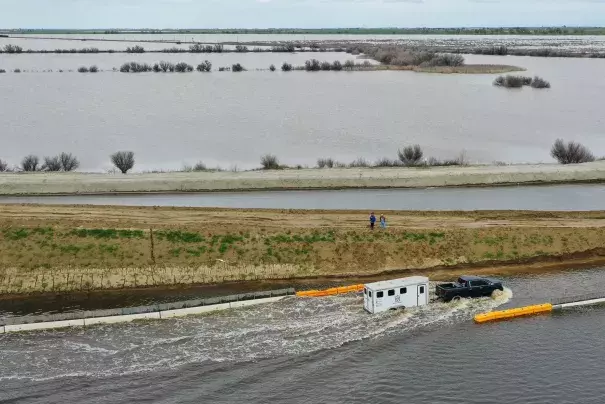California's Lake Tulare Refills, Flooding And Disaster Ensue

Before it was drained in the mid-20th century, Lake Tulare (too-LAIR-ee) in California's Central Valley was the largest body of fresh water west of the MIssissippi. Now, an onslaught of atmospheric rivers have overwhelmed some of the most engineered farmland in the country, submerging an area larger than all but one of the state's reservoirs and inflicting massive economic damage and disruption on the intensively agricultural area — it produces cotton, tomatoes, safflower, pistachios, milk and more. Impacts could remain, or even worsen, for at least two years depending on how the near-record Sierra Nevada snowpack melts. The rising floodwaters also threaten to inundate a waste conversion facility. “When the southwest corner of Tulare Lake floods, thousands of tons of L.A. County sewage sludge, containing toxic heavy metals, will become part of the mix in the newly formed lake,” said Tom Frantz, a retired local schoolteacher and environmental activist, told the LA Times. “You can’t grow food for humans where this waste has been spread.” The town of Pajaro, where many farmworkers are Indigenous and only speak languages like Mixteco from southern Mexico, illustrates the degree to which many communities across the country have been left on their own to deal with the overwhelming power of climate-fueled disasters. “The way it’s playing out is exactly as predicted,” Nancy Faulstich, founder of the local climate-justice advocacy group Regeneración, told the Washington Post. “The people with the fewest resources who are on the margins of society are going to experience these unnatural disasters. What’s clear is we are not prepared as a society for these shocks.” On Monday, President Biden signed a Major Disaster Declaration directing FEMA support resources to the town.
(Lake Tulare: New York Times $, NBC; Sierra Nevada Snowpack: Washington Post $, AP, LA Times $, Mercury News, KVPR, CNN; Sewage plant: LA Times $; Pajaro: Washington Post $; Language interpreters: The Mercury News; Biden: KSBW, CBS)
To receive climate stories like this in your inbox daily click here to sign up for the Hot News Newsletter from Climate Nexus:


